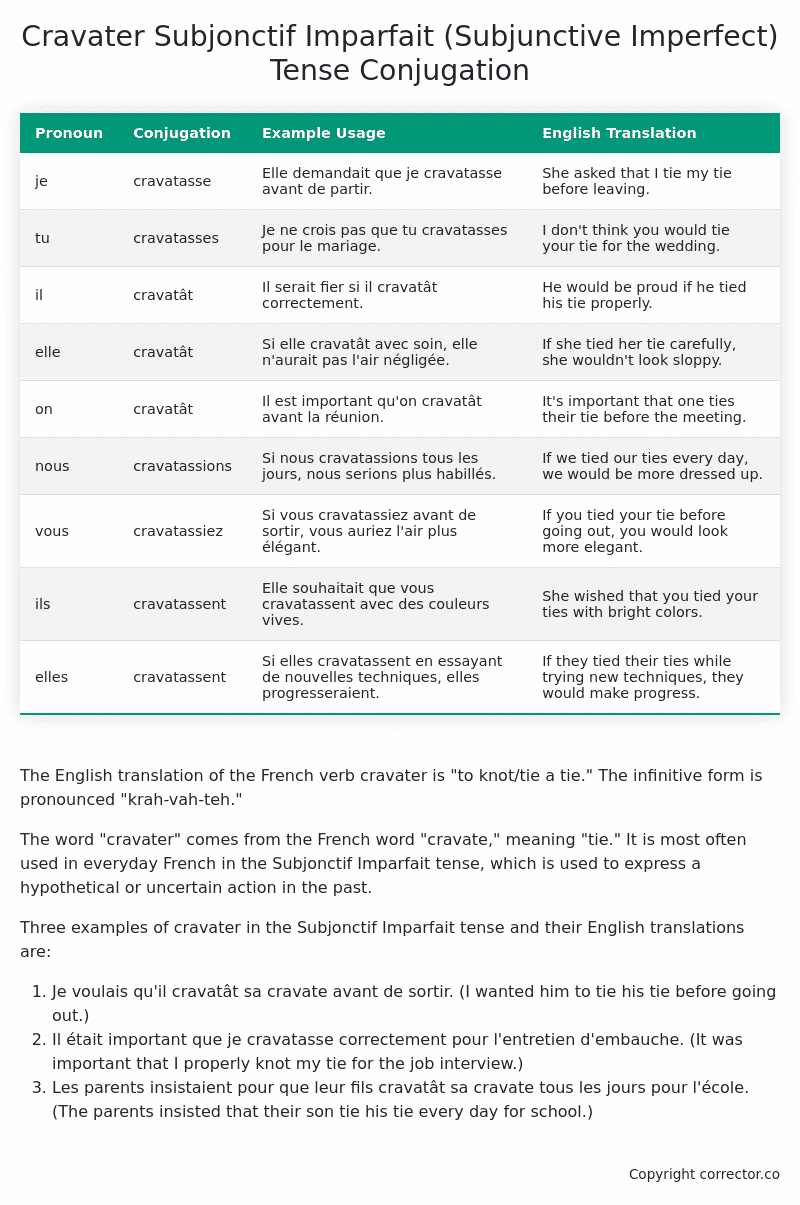Subjonctif Imparfait (Subjunctive Imperfect) Tense Conjugation of the French Verb cravater
Introduction to the verb cravater
The English translation of the French verb cravater is “to knot/tie a tie.” The infinitive form is pronounced “krah-vah-teh.”
The word “cravater” comes from the French word “cravate,” meaning “tie.” It is most often used in everyday French in the Subjonctif Imparfait tense, which is used to express a hypothetical or uncertain action in the past.
Three examples of cravater in the Subjonctif Imparfait tense and their English translations are:
- Je voulais qu’il cravatât sa cravate avant de sortir. (I wanted him to tie his tie before going out.)
- Il était important que je cravatasse correctement pour l’entretien d’embauche. (It was important that I properly knot my tie for the job interview.)
- Les parents insistaient pour que leur fils cravatât sa cravate tous les jours pour l’école. (The parents insisted that their son tie his tie every day for school.)
Table of the Subjonctif Imparfait (Subjunctive Imperfect) Tense Conjugation of cravater
| Pronoun | Conjugation | Example Usage | English Translation |
|---|---|---|---|
| je | cravatasse | Elle demandait que je cravatasse avant de partir. | She asked that I tie my tie before leaving. |
| tu | cravatasses | Je ne crois pas que tu cravatasses pour le mariage. | I don’t think you would tie your tie for the wedding. |
| il | cravatât | Il serait fier si il cravatât correctement. | He would be proud if he tied his tie properly. |
| elle | cravatât | Si elle cravatât avec soin, elle n’aurait pas l’air négligée. | If she tied her tie carefully, she wouldn’t look sloppy. |
| on | cravatât | Il est important qu’on cravatât avant la réunion. | It’s important that one ties their tie before the meeting. |
| nous | cravatassions | Si nous cravatassions tous les jours, nous serions plus habillés. | If we tied our ties every day, we would be more dressed up. |
| vous | cravatassiez | Si vous cravatassiez avant de sortir, vous auriez l’air plus élégant. | If you tied your tie before going out, you would look more elegant. |
| ils | cravatassent | Elle souhaitait que vous cravatassent avec des couleurs vives. | She wished that you tied your ties with bright colors. |
| elles | cravatassent | Si elles cravatassent en essayant de nouvelles techniques, elles progresseraient. | If they tied their ties while trying new techniques, they would make progress. |
Other Conjugations for Cravater.
Le Present (Present Tense) Conjugation of the French Verb cravater
Imparfait (Imperfect) Tense Conjugation of the French Verb cravater
Passé Simple (Simple Past) Tense Conjugation of the French Verb cravater
Passé Composé (Present Perfect) Tense Conjugation of the French Verb cravater
Futur Simple (Simple Future) Tense Conjugation of the French Verb cravater
Futur Proche (Near Future) Tense Conjugation of the French Verb cravater
Plus-que-parfait (Pluperfect) Tense Conjugation of the French Verb cravater
Passé Antérieur (Past Anterior) Tense Conjugation of the French Verb cravater
Futur Antérieur (Future Anterior) Tense Conjugation of the French Verb cravater
Subjonctif Présent (Subjunctive Present) Tense Conjugation of the French Verb cravater
Subjonctif Passé (Subjunctive Past) Tense Conjugation of the French Verb cravater
Subjonctif Imparfait (Subjunctive Imperfect) Tense Conjugation of the French Verb cravater (this article)
Subjonctif Plus-que-parfait (Subjunctive Pluperfect) Tense Conjugation of the French Verb cravater
Conditionnel Présent (Conditional Present) Tense Conjugation of the French Verb cravater
Conditionnel Passé (Conditional Past) Tense Conjugation of the French Verb cravater
L’impératif Présent (Imperative Present) Tense Conjugation of the French Verb cravater
L’infinitif Présent (Infinitive Present) Tense Conjugation of the French Verb cravater
Struggling with French verbs or the language in general? Why not use our free French Grammar Checker – no registration required!
Get a FREE Download Study Sheet of this Conjugation 🔥
Simply right click the image below, click “save image” and get your free reference for the cravater Subjonctif Imparfait tense conjugation!

Cravater – About the French Subjonctif Imparfait (Subjunctive Imperfect) Tense
Formation
Common Everyday Usage Patterns
Interactions with Other Tenses
Subjonctif Présent
Indicatif Passé Composé
Conditional
Conditional Perfect
Summary
I hope you enjoyed this article on the verb cravater. Still in a learning mood? Check out another TOTALLY random French verb conjugation!


